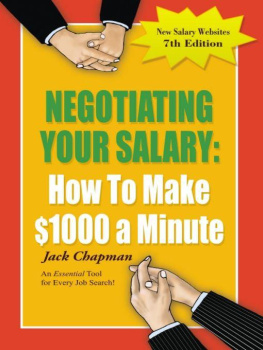Other books in the Perfect Phrases series include:
Perfect Phrases for Performance Reviews by Douglas Max and Robert Bacal
Perfect Phrases for Setting Performance Goals by Douglas Max and Robert Bacal
Perfect Phrases for Customer Service by Robert Bacal
Perfect Phrases for the Perfect Interview by Carole Martin
Perfect Phrases for Managers and Supervisors by Meryl Runion
Perfect Phrases for Resumes by Michael Betrus
Perfect Phrases for Documenting Employee Performance Problems by Anne Bruce
Perfect Phrases for Cover Letters by Michael Betrus
Perfect Phrases for Motivating and Rewarding Employees by Harriet Diamond and Linda Diamond
Perfect Phrases for Business Letters by Ken OQuinn
Perfect Phrases for Business Proposals and Business Plans by Don Debelak
Perfect Phrases for the Sales Call by Bill Brooks
Perfect Phrases for Executive Presentations by Alan M. Perlman


Copyright 2007 by The McGraw-Hill Companies, Inc. All rights reserved. Except as permitted under the United States Copyright Act of 1976, no part of this publication may be reproduced or distributed in any form or by any means, or stored in a database or retrieval system, without the prior written permission of the publisher.
ISBN: 978-0-07-170968-2
MHID: 0-07-170968-1
The material in this eBook also appears in the print version of this title: ISBN: 978-0-07-147551-8, MHID: 0-07-147551-6.
All trademarks are trademarks of their respective owners. Rather than put a trademark symbol after every occurrence of a trademarked name, we use names in an editorial fashion only, and to the benefit of the trademark owner, with no intention of infringement of the trademark. Where such designations appear in this book, they have been printed with initial caps.
McGraw-Hill eBooks are available at special quantity discounts to use as premiums and sales promotions, or for use in corporate training programs. To contact a representative please e-mail us at bulksales@mcgraw-hill.com.
TERMS OF USE
This is a copyrighted work and The McGraw-Hill Companies, Inc. (McGraw-Hill) and its licensors reserve all rights in and to the work. Use of this work is subject to these terms. Except as permitted under the Copyright Act of 1976 and the right to store and retrieve one copy of the work, you may not decompile, disassemble, reverse engineer, reproduce, modify, create derivative works based upon, transmit, distribute, disseminate, sell, publish or sublicense the work or any part of it without McGraw-Hills prior consent. You may use the work for your own noncommercial and personal use; any other use of the work is strictly prohibited. Your right to use the work may be terminated if you fail to comply with these terms.
THE WORK IS PROVIDED AS IS. McGRAW-HILL AND ITS LICENSORS MAKE NO GUARANTEES OR WARRANTIES AS TO THE ACCURACY, ADEQUACY OR COMPLETENESS OF OR RESULTS TO BE OBTAINED FROM USING THE WORK, INCLUDING ANY INFORMATION THAT CAN BE ACCESSED THROUGH THE WORK VIA HYPERLINK OR OTHERWISE, AND EXPRESSLY DISCLAIM ANY WARRANTY, EXPRESS OR IMPLIED, INCLUDING BUT NOT LIMITED TO IMPLIED WARRANTIES OF MERCHANTABILITY OR FITNESS FOR A PARTICULAR PURPOSE. McGraw-Hill and its licensors do not warrant or guarantee that the functions contained in the work will meet your requirements or that its operation will be uninterrupted or error free. Neither McGraw-Hill nor its licensors shall be liable to you or anyone else for any inaccuracy, error or omission, regardless of cause, in the work or for any damages resulting there from. McGraw-Hill has no responsibility for the content of any information accessed through the work. Under no circumstances shall McGraw-Hill and/or its licensors be liable for any indirect, incidental, special, punitive, consequential or similar damages that result from the use of or inability to use the work, even if any of them has been advised of the possibility of such damages. This limitation of liability shall apply to any claim or cause whatsoever whether such claim or cause arises in contract, tort or otherwise.
Contents
Part One
Preparing for Salary Negotiation
Money is an uncomfortable topic for most employees as well as for employers and interviewers. Many people have no idea what their parents, their friends, or even their spouse really makes. Certainly, no one can easily ask a coworker or friend, How much is your annual salary? So, we head into an interview situation with little or no practice talking about the subject of money. Maybe we enter with a lot of personal baggage, too. Add to this the lack of practice in interviewing and, most importantly, listening, and the whole conversation can be totally frustrating.
Even if you are not considering looking for a new job or are not in the middle of a job search, you will probably face discussions about your salary at annual reviews or when considering promotions or transfers. Few employees plan ahead for these important discussions; as a result they may act out of stress, embarrassment, or unease when the subject is broached.
A good manager makes plans for these discussions, and certainly an interviewer should be prepared for this integral part of the interview process, but in general many are not skilled in this regard. The most they might do is read off the salary level indicated on the job order they are seeking to fill. They are not equipped or empowered to negotiate a compensation package. The best tack to take when planning to talk about your compensation is to be prepared yourself. This preparation starts with some basic knowledge about yourself and your current situation.
Where Are You Coming From? What Is Your Current Situation?
Your outlook and your viewpoint are directly related to where you are standing right now and have a direct bearing on your negotiation dialogue. Are you currently employed and hoping for a raise? Jockeying for a better-paid position in the same company? Looking for a new job in a new company, doing the same type of work? Starting off on a new career path? Most of us will find ourselves in each of these situations, perhaps many times, during our working career. The following paragraphs discuss some of the common situations; each requires a different mode of operation.
Out of Work
There are diverse reasons why you may be unemployed at the current time, ranging from being downsized or quitting to raise a family or to go to school, to being fired for very apparent reasons (such as poor attendance or performance). You may see the handwriting on the wall and know it is a matter of time before your own position is eliminated in a management shake-up or divisional realignment. In each case, you need to do some basic preparation for your job search and inevitable money discussion.
If You Are Planning to Return to the Work Force
The duration and reason for your unemployment are pivotal to turning this into a positive element during the job interview. If you have been in the military, raising a family, or continuing your education, these are very common reasons for being out of work. Reevaluating your career path, travel, or other personal reasons (caring for an ill relative or friend) are also explanations that the interviewer has probably heard before. It is not so much why you chose the path you have been on, or how long you have been on it, but what you have done to grow and remain current with your chosen industry or trade in the interim that is of more concern. The answer you give could very likely turn you into a valuable commodity.
Next page




